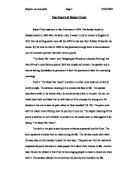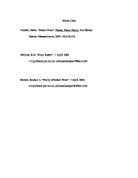The fork in the path is seen by some critics as a personal one for Frost. The fork represents a choice that he made during his life. The narrator could have taken the easy way out but decided to pick the hard way. This poem can then be read as an inspirational poem intended to make people think about their choices in life. Another way this can be viewed is that Frost is encouraging people to make a choice and stick with it. His decision allows him to continue his journey and therefore his life.
In the second poem “Stopping by Woods on a Snowy Evening” Frost uses a smooth rhythm and rhyme with few advanced techniques to keep the poem very simple but effective. Again on the surface this poem is simple and a deeper meaning is unclear. The main point seems to be that humans do not spend enough time enjoying the beauty of nature.
Frost permeates his works with the theme of death. In “Stopping by Woods on a Snowy Evening” the speaker seems to be wishing death upon himself. He wants to rest but he has commitments that mean he is unable to give up on life. The narrator says “Between the woods and the frozen lake” (ll. 7) which shows the woods and lake as a metaphor death. Frost brings in death again as he links it with sleep in the last line “And miles to go before I sleep” (ll. 15). Urban society is the representation of life. To remain alive the narrator must leave the woods.
Both poems tell stories of choices in life regarding which paths we choose. In “Stopping by Woods on a Snowy Evening” the narrator seems to be allured by the woods but knows that he must continue back to urban society. Similarly the speaker in “The Road Not Taken” is stuck at a crossroads and has to make the choice between the easy path and the road not taken. Both poems use symbolism to show the struggle between taking the extraordinary and ordinary paths in life.
Stopping by Woods on a Snowy Evening
Whose woods these are I think I know.
His house is in the village, though;
He will not see me stopping here
To watch his woods fill up with snow.
My little horse must think it's queer
To stop without a farmhouse near
Between the woods and frozen lake
The darkest evening of the year.
He gives his harness bells a shake
To ask if there's some mistake.
The only other sound's the sweep
Of easy wind and downy flake.
The woods are lovely, dark, and deep,
But I have promises to keep,
And miles to go before I sleep,
And miles to go before I sleep.
The Road Not Taken
Two roads diverged in a yellow wood,
And sorry I could not travel both
And be one traveller, long I stood
And looked down one as far as I could
To where it bent in the undergrowth;
Then took the other, as just as fair,
And having perhaps the better claim,
Because it was grassy and wanted wear;
Though as for that the passing there
Had worn them really about the same,
And both that morning equally lay
In leaves no step had trodden black.
Oh, I kept the first for another day!
Yet knowing how way leads on to way,
I doubted if I should ever come back.
I shall be telling this with a sigh
Somewhere ages and ages hence:
Two roads diverged in a wood, and I--
I took the one less travelled by,
And that has made all the difference.







